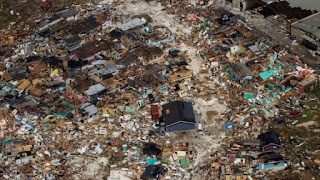Democratic
Debate III went into the books September 12 in Houston. We saw nothing that
fundamentally changed the race. Indeed, stability rates as a major take-a-way
for the evening. As we’ll get to, stability doesn’t mean set in concrete. As
we’ll also get to, the debate moderators from ABC gave us one thing we hadn’t
seen in these events before --- a chance at understanding the candidates as
people. The voters should be grateful.
Not Much Changed
The debate began with three clear leaders in the race –
former Vice President Joe
Biden as the front runner, pursued by Senator Bernie Sanders of
Vermont and Senator Elizabeth
Warren of Massachusetts. California Senator Kamala Harris was in
striking distance of the top three in most polls. All the others, to some degree,
were hanging on, just happy they made the stage under the more stringent
Democratic Party criteria for qualifying for this debate.
Polls taken over the coming days shouldn’t change much from
that lineup. That said, nearly every candidate had moments they could brag about.
Only former Housing Secretary Julian Castro apparently
hurt himself with his too-strident
attack on Biden, suggesting the 76-year old candidate couldn’t remember
what he had said just moments earlier (the pundits agreed Biden didn’t say what
Castro claimed he did).
No candidate landed a knockout punch and nobody (other than
perhaps Castro) suffered a debilitating gaffe. The race should remain about the
same, at least until Debate
IV on October 15.
A Short History Lesson
As we suggested, stable doesn’t mean permanent. In 2004, before
the voters started going to the polls and caucus rooms, John Kerry languished in
third place in the polls. Kerry won Iowa, however, and front runner Howard Dean crashed after
his infamous post-caucus
scream. Kerry captured the nomination and narrowly lost the general
election to George W.
Bush.
In 2008, Hillary Clinton held a
significant lead before Iowa, but Barack Obama won there.
The Illinois senator rocketed up the polls, grabbed the lead after the early
primaries, and rolled on to the nomination and the White House.
We note this history because the current leaders could slip.
With three debates done (and 10 or 11 candidates who didn’t qualify for Debate
III), we can’t really say it’s still “early.”
We can say the race remains far from decided and it is too early for declaring
this a two-person or three-person contest.
Some Welcome
Self-revelation
The moderators of the Miami debate on
NBC deservedly got panned for asking hold-up-your-hand questions and other silly
inquiries. The CNN inquisitors in Detroit weren’t a lot better in the second
debate. If those moderators deserved the
roasting they got,
fairness demands giving the ABC moderators credit for their enlightened performance, especially the last question. Instead of asking for plain vanilla closing statements, George Stephanopoulous asked that each candidate describe how
fairness demands giving the ABC moderators credit for their enlightened performance, especially the last question. Instead of asking for plain vanilla closing statements, George Stephanopoulous asked that each candidate describe how
he or she had overcome a professional obstacle. The question
produced refreshing self-disclosure that showed more than competing health care
plans and immigration positions.
·
Biden
– the former Vice President turned his answer personal, relating the impact of
the deaths of his wife and daughter in an auto accident right after his
election to the Senate in 1972 and the loss to cancer of his son, Beau, in 2015.
By doing so, Biden widened the scope of the question and invited personal
responses from the others.
·
Warren
– she became emotional in talking about dropping out of college after an early
marriage and children, then navigating single motherhood, a waitressing job,
law school, and turning to teaching law.
·
Harris
– she revealed many people thought she couldn’t, as a black woman, win her
races for San Francisco district attorney and California Attorney General, but
her mother taught her she, not others, should define what she could and
couldn’t do.
·
Pete
Buttigieg – he talked frankly about being gay, knowing it, and deciding he
should come out while involved in politics in Mike Pence’s Indiana.
·
Castro
– he told the story of giving up his lucrative law firm job so he could cast a
principled vote on a land deal as a city council member in San Antonio.
·
Sanders
– he described losing political race after political race, often getting a minuscule
vote, but sticking with his principles until the public caught up with him, so
he could win house and senate races.
·
Cory
Booker – his story involved overcoming opposition to his plans early in his
tenure as mayor of Newark, New Jersey and living in a tough, inner city
neighborhood.
·
Amy
Klobuchar -- she vividly described how having an insurance company kick her out
of the hospital right after her sick daughter’s birth inspired her to petition
Minnesota legislators for a law giving mothers more hospital time with their
newborns.
·
Beto
O’Rourke – he detailed his anguish over the mass shooting in August in his
hometown of El Paso, Texas and the inspiration the victims of that shooting
have given him through their courage.
·
Andrew
Yang – he related the history of his entrepreneurial efforts in light of how he
and his parents grew up.
The debates had revealed a deeper Democratic bench than
initially thought. While the odds are
the nominee will emerge from those at the top of the current polls, the
compelling stories the candidates revealed indicate the quality of the field
and suggest someone might catch fire and turn the race on its head. It has happened before. Let the debates continue, making the voters
the ultimate winners.




























